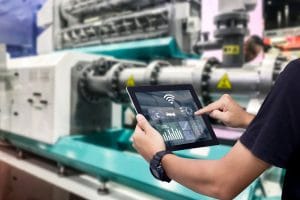 Since they first became a popular and well-known thermal management solution, heat exchangers have had an intricate relationship with the field of manufacturing. On one hand, their ability to streamline electrical cooling and other thermal management concerns have made them essential to modern manufacturing companies’ efficiency and productivity. On the other hand, as manufacturing has steadily advanced, heat exchanger manufacturers have gained important advantages in their ability to create and customize thermal solutions for increasingly more companies. In this relationship, heat exchangers and advanced manufacturing techniques have both evolved off of the advancements of the other.
Since they first became a popular and well-known thermal management solution, heat exchangers have had an intricate relationship with the field of manufacturing. On one hand, their ability to streamline electrical cooling and other thermal management concerns have made them essential to modern manufacturing companies’ efficiency and productivity. On the other hand, as manufacturing has steadily advanced, heat exchanger manufacturers have gained important advantages in their ability to create and customize thermal solutions for increasingly more companies. In this relationship, heat exchangers and advanced manufacturing techniques have both evolved off of the advancements of the other.
Thermal management for most manufacturing
In most manufacturing companies, the needs for thermal management are similar. Most commonly, that need is in the form of having to keep their many different technological solutions properly cooled throughout their operations. Traditionally, companies had to rely on air conditioners or air compressors to ensure that their electrical enclosures didn’t overheat. With heat exchangers, they can achieve more efficient and reliable electrical cooling for all of their electrical enclosures, all while using only a fraction of the energy that their traditional electrical cooling systems required.
Advanced manufacturing for modern heat exchangers
With the ability to keep their electrical systems cooled without having to spend fortunes on energy and electrical cooling methods, manufacturing companies have been able to significantly advance the technologies they rely on. That includes manufacturers of heat exchangers. With methods such as comprehensive digital analysis and collaborative manufacturing techniques, along with 3D prototyping capabilities and more, companies can implement ways to create custom-designed heat exchangers and other thermal solutions for a wide variety of industries.
Making thermal management easier in other industries
While heat exchangers and manufacturing technologies are closely related, heat exchangers have been just as beneficial for nearly every other industry, as well. All modern companies rely on technology to certain degrees, and their ability to cool those technologies rapidly, reliably, and efficiently plays a significant role in their overall efficiency and overhead costs. One of the most important advantages of modern heat exchangers is that they can address most thermal management concerns using natural, eco-friendly heat transfer methods, such as phase-change cooling. This makes them easily adaptable to meet most companies’ thermal management needs.
For more information about the relationship between heat exchangers and manufacturing, call Noren Thermal Solutions in Taylor, TX, at 866-936-6736.







